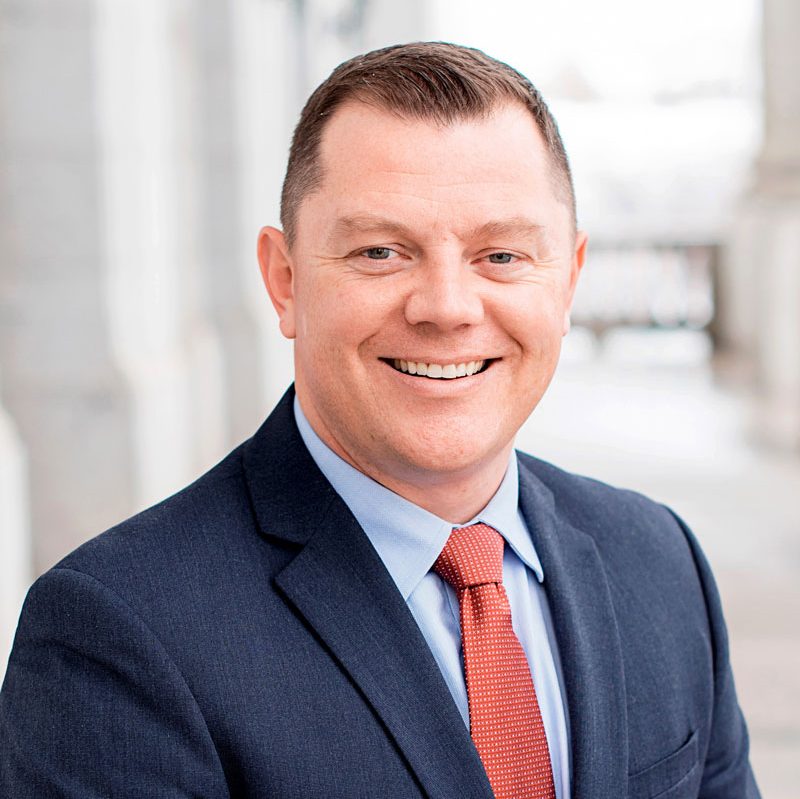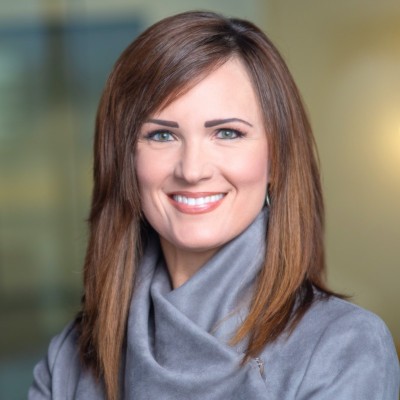Audio
Business Elevated Podcast (Episode 58)
This podcast series features business and government leaders discussing what it’s like to live and work in the great state of Utah. This episode includes a conversation between Ryan Starks, managing director of business services at the Governor’s Office of Economic Development, and Ally Isom, chief strategy and marketing officer at EVŌQ nano.
The Business Elevated podcast is also available on Apple Podcasts, Spotify and Stitcher.
Transcript
Introduction
Welcome to the Business Elevated Podcast, where we discuss what it’s like to live and work in the great state of Utah. Did you know Utah is frequently ranked the best state for business by Forbes? This podcast is a production of the Utah Governor’s Office of Economic Development. Thanks for joining the conversation.
Conversation


Ryan Starks: (0:22) Welcome to the Business Elevated podcast. I’m Ryan Starks, managing director of business services at the Governor’s Office of Economic Development. My guest today is Ally Isom, who is the chief strategy and marketing officer at EVŌQ nano. Ally, welcome to the show.
Ally Isom: (0:39) Thank you, Ryan. And I’m so glad to be with you today.
Ryan Starks: (0:42) Thanks for joining me. You and I go way back, and our paths have crossed many times. Let’s first talk about you. Anybody that knows Ally Isom knows that she’s one of the rock stars in the state.
Ally Isom: (0:56) Oh, you’re kind.
Ryan Starks: (0:58) Ally and her husband live in Kaysville. And I understand that you got involved civically early on. Tell us about that.
Ally Isom: (1:07) Eric and I met in political science 110 in my freshman year at BYU and quickly became one of those unplanned cliches at BYU. Right out of college, I managed political campaigns. I helped run Gary Herbert’s congressional and local county commission races.
So that was one way that I met the governor early on in my career. And I ran political campaigns between babies. I served on the city council eventually in Kaysville. And then, I worked in the governor’s office as deputy chief of staff over communication. I was responsible for policy communication, media, and constituent services.
Ryan Starks: (1:55) That’s awesome. You’ve also dabbled in other state agencies. Tell us about that.
Ally Isom: (2:00) I love my history and state agencies. I think that’s where I cut my teeth on public policy and learned to understand that all of these laws have a face. Some people are affected by them. So, I started in what was then community and culture. It had just been separated from economic development as a new department, and I worked with two terrific executive directors. I was there for five years, and then I went to work at the polar extreme at workforce services as their government affairs director. They were up to their eyes in audits and scrutiny from the state Legislature. I was there for about a year before the governor asked me to join him on his executive team.
Ryan Starks: (2:48) That’s wonderful. And having spent some time in and out of the state government system, I have nothing but respect for you. Anybody that knows Ally knows that she does quality work and one of the go-to people. So then you left the state government and decided to accept a job for the Church of Jesus Christ of Latter-day Saints. And I think that was an interesting transition from state government to a large religious organization. Tell us about that experience.
Ally Isom: (3:16) I loved working for the church. I started in their public affairs department, where I was the director of community and family relations. I had a diverse portfolio. I worked on LGBTQ issues, women’s outreach, racial issues, and interfaith issues. I loved outreach to the community and the greater world on behalf of the church. After three years, I took a job that was a brand new post for the church as the director of institutional messaging and identity, code for branding. And it was breaking some ground for the church, in terms of how it speaks to the world, and participated in a groundbreaking study of those of our faith and not of our faith globally. I learned a lot about the different people on this planet and the amazing view they have of the divine and how much they have in common with one another. It was a tremendous experience. I’m proud of the body of work that we accomplished while I was there.
Ryan Starks: (4:24) That’s remarkable. So you’ve served in the highest levels of state government and at the highest levels of the global church in the Church of Jesus Christ of Latter-day Saints. That experience pivoted a little while ago when you decided to go into the private sector. Is that right?
Ally Isom: (4:42) Yes. I had been at the church and felt like I’d done what I was supposed to do there and had an opportunity to jump back into the private sector and did so.
This little startup is poised to jump into growth mode. It was fantastic timing. But I was so intrigued by their technology and the caliber of people on their team. World-class scientists and tremendous businesspeople, a solid board. And it just felt like a good fit for me and a new frontier. I’m always wanting to push and challenge myself. And this was an opportunity to take the skillset I had and break some new ground. I loved it.
Ryan Starks: (5:27) Wonderful. And they’re lucky to have found you. Did they reach out to you? Did you have a previous relationship with EVŌQ nano, or did you find them?
Ally Isom: (5:37) I had a friend of their CEO who wanted to pick my brain on an issue they were grappling with, and it developed organically from there as we continued to talk. I did some early advising, and it soon became apparent that I could be much more effective within the organization and that we could build a strategic plan that could help the organizations go to the next level.
It’s been fantastically fun to use that strategy piece of my brain and an opportunity to watch this company make a difference in the world. After you worked for the governor, and then you work for God, you want to do things that matter. And this felt like an opportunity to make a difference in people’s lives. That’s the paradigm every one of my colleagues buys into as we’ve joined EVŌQ nano.
Ryan Starks: (6:36) Wow. And I love how you described it as fantastically fun. How long have you been with EVŌQ nano, and where are they located?
Ally Isom: (6:44) For about nine months and we’re located in North Salt Lake. I suspect we’re going to have growing pains in the next six to 12 months as licensing opportunities ramp up for us. We make nanomaterials, and they has many applications. We’ve got some terrific data demonstrating potential in energy, biotech, pharmaceuticals, textiles, surface preservation, and corrosion anti-microbial properties. We anticipate significant growth now that we have some good quality data and research behind us. So I don’t know how long we’ll be in North Salt Lake, but for now, Utah’s home, and it’s such a great fit for our company.
Ryan Starks: (7:30) Wonderful. And hopefully, we can look back in 10 years as you’ve experienced growth as a company, and we can still say that Utah’s home.
It seems like our tech community is on the rise. We have our Silicon Slopes, but people sometimes think that we only have Silicon Slopes, but we have so many other tech companies spread throughout the state. St. George is really a hotspot, as well as Salt Lake and Davis counties.
Ally Isom: (7:58) Yes. And I have to mention one of the things that’s been most exciting to us early on is we joined BioUtah to be part of that biotech and pharma community. The announcement of BioHive, and the inclination of the industry to create a consortium ,create a synergy between companies, and create visibility that helps investors understand what fertile ground there is in Utah. We are grateful and excited to be part of that.
I told Katelin Roberts early on that EVŌQ nano is the poster child for the BioHive. We are exactly the kind of homegrown company that is doing good things in the world. It’s a great fit and some bragging points for Utah.
Ryan Starks: (8:52) I was invited to serve on the BioHive board. And as we look at the different caliber of companies, it’s very impressive to see our portfolio of private companies in Utah that started small, expanding their footprint, and doing great things. How many people are employed at EVŌQ nano?
Ally Isom: (9:12) We’re still pretty small, roughly about 20 people plus or minus some interns coming and going.
Ryan Starks: (9:18) What a wonderful time to be there. Right from its beginning.
Ally Isom: (9:21) Yes. That’s what made it so exciting to get on the ground floor and help shape the direction we go.
Ryan Starks: (9:26) That’s great. If somebody were to ask you, tell me about EVŌQ nano in 30 seconds, what would you tell them?
Ally Isom: (9:36) I would tell them EVŌQ nano represents the next generation of nanotechnology. Historically nanotech has been a little bit over-hyped and under-delivered. We have the ability with this new patented method to create nanoparticles. It’s a high energy method where we can mass produce custom-engineered nanomaterial. Nanoparticles are the smallest of the small of the nanoparticles. And they’re not ionic, which is incredibly unusual. Our technology demonstrated that it can manifest anti-microbial characteristics.
We recently partnered with a grant from the national cystic fibrosis foundation, Seattle children’s hospital, and the University of Washington. We did in vitro testing on some of the world’s worst superbugs and demonstrated efficacy against up to 60 of them, which surprised us. So, we do know we can kill these pathogens in a way that is unique. We’re now moving into toxicology studies and pre IND phase with the FDA, which means we’ve launched a regulatory path for our biotech and pharma. We have some promising potential.
Ryan Starks: (11:10) Sounds fascinating. Who are some of your principal clients? Are you contracting with the government, or is it business-to-business?
Ally Isom: (11:19) It’s primarily business-to-business. We’re looking at several licensing opportunities. We license our material to others as a key ingredient for their applications.
One application that I think is fascinating, especially given what’s happening with the pandemic, is we are licensed to an organization called FUZE Biotech. They use our materials to treat high-end textiles, and it gives them anti-microbial characteristics for numerous washes, sometimes up to 50 washes. We find that there’s a lot of opportunity in that arena. So we’re also investigating the possibility of being a disinfectant. Something that nobody else is. And that’s a silver particle that is safe to use and won’t harm the environment in any way, and safe to be around humans. We’re still in the prototyping development in that arena, but I think that’s fascinating. We also have a partnership with some of the leading lead-acid battery manufacturers.
We’ve learned through our research at the University of Utah; and using the nano lab, you start projects early on. But we’ve learned that our materials change the chemistry that the physical properties in lead-acid battery electrolyte, and have the potential to make the batteries last longer and be less toxic to the environment.
We’re working hard. Our division, EVŌQ energy, is working on a prototype to burst into the home energy and storage arena. Tesla, watch out, we’re coming!
Ryan Starks: (13:10) Love it, just what we wanted to hear. So in 10 years, what do you think EVŌQ nano looks like?
Ally Isom: (13:18) This is a great question. Because my imagination goes a little bit wild, and I need to be realistic. This FDA path takes time. It takes time to get approvals. And right now, our approval process looks like we would be an inhaled therapeutic for cystic fibrosis patients. And we plan to be certified as an orphan drug and accelerated through that path.
Once we demonstrate that we’re non-toxic to the human cells, I hope we are saving the lives of cystic fibrosis patients and making a difference for those families who every three months take their child in to be tested to see if they’ve acquired any of these terrible superbugs pathogens. So far, we’ve got a lot of promise in the data, but I hope by then we’re on the market and making a difference for those families. By then, our energy division will be a lot stronger with a prototype actively out there with partners in a go-to-market scenario.
Ryan Starks: (14:28) Awesome. One of the issues and opportunities that Utah often experiences is workforce development. And so you have a team of about 20 people likely to grow in the coming two years. What does the ideal candidate look like if somebody was interested in your company? What skills do you look for?
Ally Isom: (14:50) We look for a broad array of skill sets. We have the business side, which I think most companies would have on the science side. What fascinates me is the nature of a nanoscientist. So nanotech is this tremendously exciting convergence of physics, chemistry, microbiology, applied sciences, and engineering.
And as a non-scientist, I think these nanoscientists are a unique breed. They like a challenge, and they all come with their way of speaking about science. And they have to learn to communicate with one another and understand different disciplines. Some scientists wouldn’t want to be bothered by the intrusion on their discipline or skill. But I find among nanoscientists there’s not a primadonna among them. They are collaborative, energetic, and open-minded. Our tagline is limitless discovery. And we believe that when you get these talented, capable humans together, they do amazing things. They start to have that synergistic dialogue about what’s cutting-edge in their scientific field. And there’s an excitement and an energy that’s unique among them. They have a big problem and be willing to be patient in solving it.
Ryan Starks: (16:24) So what’s the tagline again?
Ally Isom: (16:26) Our tagline is Limitless Discovery.
Ryan Starks: (16:30) Limitless Discovery.
Ally Isom: (16:32) We believe that the potential of nanomaterials is unknown. This is the frontier of science. Materials behave differently on a nanoscale than they ever do on a macro scale. And so things that are supposed to be liquid are gaseous. Items that are supposed to be stable are unstable, or items that are supposed to be fluid are suddenly solid. And it’s unpredictable in some ways.
We’re learning a lot, but I have to credit the University of Utah’s nano lab and their STEM microscope. It’s unlike any other. There are three on the planet, and we are still privileged to have this technology in our backyard that lets us see where our particles are in a cell. We can see they’re evenly distributed. We can see the cell wall is intact with that kind of microscopy. It is fascinating, unusual, and invaluable to the work we do.
Ryan Starks: (17:49) I have to give you credit. You’ve done a very nice job of learning the vernacular of a scientist. And it’s been fun to visit with you, and I appreciate your time. If somebody wanted to learn more about EVŌQ nano, where would you point them?
Ally Isom: (18:06) I would point them to our fantastic website, which is evoqnano.com. That’s E-V-O-Q-N-A-N-O.com, and there we have access to some more information about our technology and our fantastic team of people.
Ryan Starks: (18:27) Excellent. Thank you for your time this afternoon. I enjoyed visiting with you and catching up, And again, my name is Ryan Starks. I’m the managing director of the Governor’s Office of Economic Development, and you’re listening to the Business Elevated podcast.
Conclusion
Thanks for listening to the Business Elevated podcast, a production of the Utah Governor’s Office of Economic Development. Listen to other episodes where you get your podcasts or at business.utah.gov.
